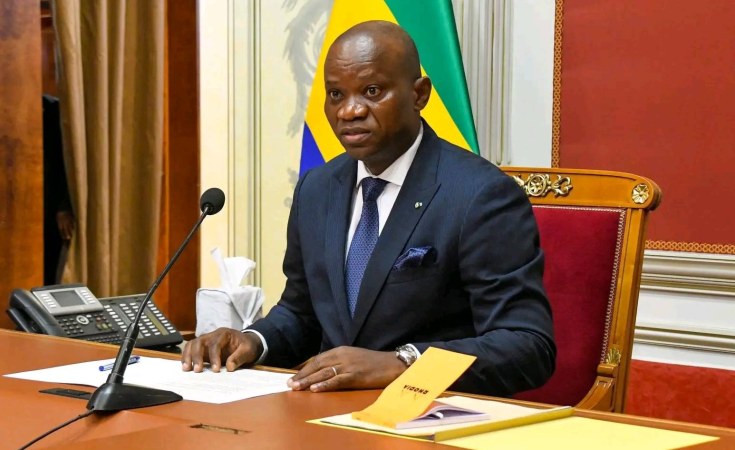The transitional President of Gabon, Brice Clotaire Oligui Nguema begins his first official visit to France this Tuesday with an entourage of several ministers and will be received by President Emmanuel Macron at the Élysée Palace.
Bilateral relations, subjects of common interest such as climate and forests, and the progress of Gabon's transition will be on high on the agenda for discussion during Oligui Nguema's trip to Paris.
The interim leader's working visit will also serve to distance Gabon from Sahel countries such as Mali, Burkina Faso and Niger, which have been shaken by a string of coups d'états and the rejection of French influence in the region.
"It's clear that our transition has little to do with that. We want to show that our situation is different.
"Our relationship with France must be one of normality, in the same way as our other partners", a source told RFI.
Brice Clotaire Oligui Nguema will be received at the Élysée Palace by his French counterpart Emmanuel Macron on Friday 31 May.
However, some see this visit as the Gabonese head of state seeking legitimacy from France.
Under former president Ali Bongo Ondimba, Franco-Gabonese relations had gone through chilly periods.
Libreville also seemed to be drifting away from French interests when it joined the British Commonwealth two years ago.
But last August's putsch did not aggravate the cooling of relations.
On the contrary, the two countries have visibly maintained close ties.
On 31 August - the day after the putsch - Oligui Nguema received the French ambassador Alexis Lamek and the head of the DGSE secret service as a sign of good faith.
The transitional administration restored France 24 and RFI broadcasts that had been interrupted by the former government on the day of the election on 26 August.
At the same time, the French company Eramet resumed its manganese extraction activities at the Moanda mine.
French military presence
As it stands, Gabon remains at least partially suspended from the Commonwealth and the African Union, but being received in Paris could help Libreville to return fully into the fold.
The French military base in Gabon - which has been located at Camp de Gaulle since 1960 - is expected to be discussed during the visit. This is a sensitive issue for Paris, which has recently seen the departure of its soldiers from Mali, Burkina Faso and Niger in succession.
The French President's "personal envoy" for Africa, Jean-Marie Bockel, was in Gabon in March and is said to have presented the latest plans for the future of the 380 or so French soldiers and staff from the Ministry of the Armed Forces currently on the ground.
A reduction in the number of military personnel is reportedly being considered.
Le mercredi 29 mai 2024, se tiendra à Paris (France), le premier forum économique Gabon-France axé sur le thème : << Un nouveau partenariat économique >>. Pour en savoir plus : https://t.co/aYqaiLdPPg #Gabon 🇬🇦 - #France 🇨🇵 pic.twitter.com/jw19O0EMJi-- Ministère de l'Économie et des Participations (@MEP_Gabon) May 22, 2024
Reassuring investors
On 29 and 30 May, President Oligui Nguema will also be attending the Gabon-France economic forum, organised for the occasion.
The meeting, which will be attended by business leaders from both countries, will feature a number of round tables, providing an opportunity to find out about Gabon's economic situation, examine business opportunities and exchange views with decision-makers and investors.
The message from Libreville is simple: Gabon is not Niger, Mali or Burkina Faso. French companies are still welcome, even if the interim administration would like to see relations that are more beneficial to the country's businesses.
Homage to WWII colonial riflemen
During his stay in Paris, Brice Clotaire Oligui Nguema is due to to meet with the Gabonese diaspora on Saturday.
On Sunday, he is due to leave Paris for the Somme, where he is expected to attend commemorations of the Battle of Airaines, which took place in June 1940.
The fighting - in the midst of a German offensive - was particularly violent, with Senegalese riflemen playing a key role, particularly the 53rd Mixed Senegalese Colonial Regiment, made up of soldiers from what were still French colonies.
At their head was Gabonese Captain Charles N'Tchoréré - born in Libreville and the only officer to remain in the front ranks of the fighting - who was eventually executed by the Nazis.
Oligui Nguema will then return to Gabon later in the day.


